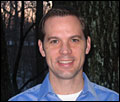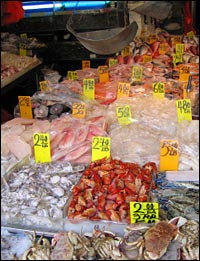
Michael Boots.
With what environmental organization are you affiliated?
I am the director of the Seafood Choices Alliance, which is the largest program of the communications-based organization SeaWeb.
What does your organization do?
Seafood Choices Alliance is a global trade association that works on the issue of ocean-friendly seafood. The alliance helps the seafood industry — from fishers and fish farmers to distributors, wholesalers, retailers, and restaurants — make the seafood marketplace environmentally and economically sustainable. There is a growing interest worldwide in environmentally responsible seafood. Seafood Choices Alliance mobilizes and connects the world’s leading voices in support of a sustainable supply of seafood choices, highlighting the need for a global solution to threats facing the ocean.
What are you working on at the moment?

Mind over mussel.
Photo: iStockphoto
We’re all about facilitating dialogue. We connect people and organizations that don’t normally have a reason to connect. We serve as a bridge between two camps — the conservation community and the seafood industry — that were on opposite sides of the debate over fishing for far too long. In that capacity, we just wrapped up our annual conference, the Seafood Summit, which brought together hundreds of leaders from the growing sustainable-seafood marketplace. It’s the kind of event where you can find the head of corporate social responsibility for McDonald’s eating lunch with an oceans campaigner from Greenpeace and the finance director from a socially responsible venture capital fund.
With that event behind us, we’re turning our attention to the world’s biggest seafood trade shows, held each spring in Brussels and Boston. At those shows, we’ll host business-to-business dialogues and present awards to some of this movement’s emerging leaders.
How do you get to work?
When I’m in the D.C. area, I take the bus or walk. But more often than not, I’m on the road, meeting with alliance members and other leaders in North America and across Europe. The good news is that our organization recently instituted a carbon-offset program to compensate for all of that travel.
What long and winding road led you to your current position?
For more than 15 years, my career path has been focused on the conservation of natural resources. Before joining the alliance in 2004, I was the environmental and natural-resources adviser to the governor of California (before he was unceremoniously “terminated”), representing the governor, his cabinet, and the state before Congress and the federal government. I began my career as development associate for American Oceans Campaign (now Oceana), and since that time have worked to engage businesses, policymakers, and consumers on a wide array of environmental issues. I also worked at the U.S. EPA in the Clinton administration, forging solutions to water-quality and coastal-protection challenges. At one time or another, I was working on forestry, wetlands, oceans, endangered species, energy conservation, water quality, and the stewardship of public lands — but all focused on finding innovative ways to protect and conserve those precious resources.
Where were you born? Where do you live now?
It often feels like I’ve spent my entire life in motion. Born in Memphis, Tenn., I grew up between Chicago and California, with time in Southeast Asia and Australia. I now live outside Washington, D.C., in Silver Spring, Md.
What’s been the best moment in your professional life to date?
At a gathering of the Aspen Institute late last year, a few of us were asked to address the group about our work and the role of innovative leadership in driving change. There I was with corporate leaders from McDonald’s, IBM, Toyota, and Time Inc., and thought-leaders from Harvard Business School and other leading institutions, and they were intensely curious about the success of an organization like ours in driving innovation within this sector. They were looking to us for answers about the future. I was really moved by the power of that moment, and the importance of the work I do. And I was gratified to be in a room filled with folks who understood the value of building bridges and seeking out the art of the possible. It just illustrates the critical time of synergies we all find ourselves in — where the conservation community sees the need to engage business, and global companies are stepping up to the plate to fundamentally change the way they do their jobs.
What environmental offense has infuriated you the most?
The appalling lack of U.S. leadership on the issue of climate change. When the environment and the rest of the world were calling out for some sense of urgency and action, our government dropped the ball. Nobody is asking that we solve this problem on our own, but we can certainly do our best to contribute to solutions. As I work now to ensure a sustainable supply of fish well into the future, the issues of climate change — from sea-level rise to ocean acidification — permeate our work.
Who is your environmental hero?
The obvious choices all come to mind — Al Gore, Jacques Cousteau, and Theodore Roosevelt — but a less obvious choice is Kevin Bacon and his new organization Six Degrees. It’s a case of making wine from sour grapes (I’ll drink to that!) and bringing his celebrity status, and that of many others, to bear on many important environmental and social causes. The idea that we’re all connected is something to keep in mind about the ocean, too. Everything — our garbage, sewage, emissions into the atmosphere — eventually ends up there. And it doesn’t matter if you live on the coast or inland, we’re all affected. For example, the dead zone at the mouth of the Mississippi River in the Gulf of Mexico is caused by urban, suburban, and agricultural runoff hundreds of miles away.
What’s your environmental vice?
I simply love to eat shrimp. And while I know it has so many environmental and social challenges associated with it, the good news is that there are more and more producers that are making better decisions every day. I’m hoping that one day soon those trends become the rule rather than the exception, so that all of us can feel good about eating it too.
How do you spend your free time (if you have any)?
Free time is hard to come by these days. I’ve got a two-and-a-half-year-old daughter and another baby on the way. But any time away from work is spent hanging out with my wife and family and getting outside.
What’s your favorite meal?
That’s easy — delicious sustainable seafood and some incredibly fine wine.
Which stereotype about environmentalists most fits you?
I don’t believe in these. You just can’t judge a book by its cover — or a bottle of wine by its label, for that matter! The Seafood Choices Alliance is all about breaking down the barriers to communication between all who have a stake in this problem and its solutions. That often involves doing away with long-persistent stereotypes — and we’re succeeding.
What’s your favorite place or ecosystem?
Any beach I can get to. A place to put my toes in the water and let time slip away. Every summer we head up to Cape Cod, playing in the sun and surf between the bay and the Atlantic Ocean. The cape holds a special place in my heart — it’s where I first introduced my daughter to the wonders of the ocean!
If you could institute by fiat one environmental reform, what would it be?
I’d force us all to walk a mile in each other’s shoes. The answers to the questions that lie before us are way too complicated and nuanced and challenging to be solved from one perspective. If we’re going to find a way forward — a better way forward — we need to stop demonizing each other and have a much deeper appreciation for how the guy sitting next to us could be part of the solution.
What’s your favorite movie?
Shouldn’t it be Finding Nemo?
Which actor would play you in the story of your life?
Clint Eastwood, as director and actor. In Flags of Our Fathers and Letters From Iwo Jima, he has assumed the point of view of two entirely opposed camps, and done beautiful justice to each. And he’s an activist for the planet to boot.
If you could have every InterActivist reader do one thing, what would it be?
Become seafood savvy. Carry a wallet card from the Monterey Bay Aquarium or Environmental Defense [PDF], and don’t be shy about asking your restaurant server or fish-counter rep about the sustainability of the fish being offered. Become educated about the best seafood choices out there and act on that information.

